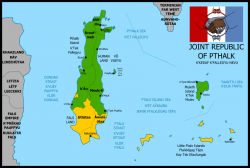Difference between revisions of "Archive:Joint Republic of Pthalk"
| Line 121: | Line 121: | ||
==Etymology== | ==Etymology== | ||
The name 'Pthalk" ([[Dhwer language|Dhwer]]: ''Pþālk'') most likely is related to the [[Pthalki-Dhwer creole]] name for the island ''Fálleg'', itself a distortion of the [[Faljüdax]] name of the island ''Falamefflég'' (alternately, the name may be a Pthalki-Dhwer rendering of "Fals"). | |||
The name 'Pthalk" ([[Dhwer language|Dhwer]]: ''Pþālk'') most likely is related to the [[Pthalki-Dhwer creole]] name for the island ''Fálleg'', itself a distortion of the [[Faljüdax]] name of the island ''Falamefflég'' (alternately, the name may be a Pthalki-Dhwer rendering of "Fals"). | The name 'Pthalk" ([[Dhwer language|Dhwer]]: ''Pþālk'') most likely is related to the [[Pthalki-Dhwer creole]] name for the island ''Fálleg'', itself a distortion of the [[Faljüdax]] name of the island ''Falamefflég'' (alternately, the name may be a Pthalki-Dhwer rendering of "Fals"). | ||
Revision as of 06:52, 16 May 2016
| Joint Republic of Pthalk k'Kedaf k'Fállegyu Nevu kqkedàf kqfällegyu nevu Védütaa Mindvuir Falamefflég ey KeÞkədāþk KePþālkyuw Hrə̄b Iatai Viides Mient Afai Falsemiepteiej |
||||
|---|---|---|---|---|
|
||||
| Motto: "Strength in Diversity" | ||||
Map of the Joint Republic of Pthalk.
|
||||
| Capital | Klefdu | |||
| Government | ||||
| - | President | Korel Abirkersttep | ||
| - | Vice President | Klẽfá Krúvav | ||
| Legislature | Joint Legislature | |||
| - | Upper house | Fals Legislature NAME? | ||
| - | Lower house | Human Legislature NAME? | ||
| Population | ||||
| - | 2016 estimate | 1,258,391 | ||
Pthalk, officially the Joint Republic of Pthalk, is a smól island country located in central Boroso in the Taanttu Sea. It shares maritime borders with the Fals Empire, Letzia, the Terminian Far West and Khaazland. Until early 2016, Pthalk was an overseas territory of Dhwer. It gained independence on DATE.
Etymology
The name 'Pthalk" (Dhwer: Pþālk) most likely is related to the Pthalki-Dhwer creole name for the island Fálleg, itself a distortion of the Faljüdax name of the island Falamefflég (alternately, the name may be a Pthalki-Dhwer rendering of "Fals").
The name 'Pthalk" (Dhwer: Pþālk) most likely is related to the Pthalki-Dhwer creole name for the island Fálleg, itself a distortion of the Faljüdax name of the island Falamefflég (alternately, the name may be a Pthalki-Dhwer rendering of "Fals").
The name "Pthalk" has been reborrowed back into Faljüdax as Ftalx for several placenames in the country. This has been itself reborrowed into Pthalki-Dhwer as Eftauf in those specific placenames.
History
Geography
Geology
Climate
Biodiversity
Politics
Government
The current government of Pthalk, since gaining its independence from Dhwer, is provisional. Currently, the government runs under the provisions set out in the Treaty of CITY signed on DATE. A permanent constitution is currently being written by the provisional government in Kleftu. It is expected to be ratified sometime in 2017.
The provisional President is former freedom fighter and general of the Joint Fals-Human Liberation Army, Korel Abirkersttep. His Vice President is Klẽfá Krúvav, a human who was Abirkersttep's lieutenant during the fight for independence.
According to the treaty, the Human and Fals each elects their own legislative body which makes laws for their respective regions. The legislators then meet together in Kleftu in order to pass national laws. This arrangement is expected to continue on with the new constitution.
Administrative divisions
Pthalk is divided into two autonomous regions: Vu Vueyu to the north, which is occupied mostly by humans and ???? to the south which is majority Fals.
Vu Vueyu is about twice as large as ???? and consists of the northern two-thirds of Pthalk islands and Mutheth and Naadher islands. It has five departments: Kleftu, Kraufmeb, K'Au, Meukre and Muleth Island. ???? consists of the southern third of Pthalk Island, a small enclave on the west coast of Pthalk in the middle of K'Au as well as the Little Ftalx Islands. It consists of three ???: Utlutaa, Awulsutaa and Ftalxlegag Teps (the Little Ftalk Islands).

